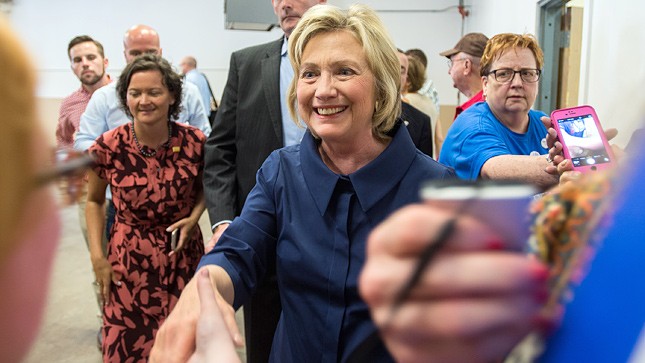
Hillary Clinton’s pledge to curb the influence of billionaires on American politics is dividing the donor community, with support splitting sharply down party lines.
Major Clinton donors Jeffrey Katzenberg and Marc Nathanson applauded her policy announcement to restrain big money politics, but her proposals received a frostier reception in conservative donor quarters.
Clinton declared on Tuesday that if elected president she would change laws to restrict the influence of secret, unaccountable money in presidential and congressional campaigns.
Clinton’s ideas include more timely and complete disclosure of individual and corporate donations, introducing a publicly financed “donor-matching” system to encourage less wealthy people to make smaller donations and overturning the Supreme Court’s controversial 2010 Citizens United decision, which set the stage for unlimited money in U.S. elections.
Some of Clinton’s biggest supporters — including donors writing six- and seven-figure checks to the pro-Clinton super-PAC — cheered her announcement, despite the fact that their influence would wane if Clinton’s policies are enacted.
Hollywood producer Jeffrey Katzenberg is one of the biggest donors in Democratic politics and has already given $1 million to Clinton’s super-PAC. But nobody would be happier than Katzenberg if Clinton puts an end to the big money era through her policies to overturn Citizens United and impose stricter disclosure laws.
“Citizens United is one of the worst decisions the court has ever made, and it undermines the democratic process,” said Andy Spahn, an adviser to Katzenberg.
Billionaire California investor Marc Nathanson agrees.
“I hate super-PACs … and I’m totally against them,” said Nathanson, who has already given $250,000 to Priorities USA Action, the pro-Clinton super-PAC.
As long as Citizens United stays on the books, Nathanson will write large checks to support Democratic candidates. “That’s the law of the land, and we can’t let the Republican presidential candidates own that realm,” he said.
Clinton’s campaign finance policies also received support from donors likely to support a potential opponent of hers — Joe Biden.
Jim Kreindler, former chair of Biden’s New York presidential campaign in 2008, support’s Clinton’s proposal. “Obviously, Citizens United is a problem,” Kreindler said. “I don’t know how anybody could think it’s a good idea.”
One dissenting Democratic donor is the long-time Clinton supporter Bill Brandt, who believes raising and spending money on behalf of political candidates is a fundamental right of free speech. Brandt, who runs the financial restructuring firm DSI Civic, said, “I am probably one of the only Democrats who believes that Citizens United was correctly decided.”
Republican donors and conservative activists were less impressed with Clinton’s proposal.
Anthony Scaramucci, a New York financier and a national finance co-chair to Scott Walker’s campaign, said donors and fundraisers would work within whatever legal environment they are presented with.
But he said the influence of big money was greatly exaggerated and that while candidates needed enough money to run a competitive campaign — he puts that “enough” figure at $35 million to compete in a GOP presidential primary — all the money in the world cannot buy victory.
“The great irony is that the bogeyman that Mrs. Clinton is referring to is a hollow ghost,” Scaramucci said. As to the contention that money buys elections, he said, “There’s nothing to it.”
Stanley Hubbard, a Minnesota broadcasting billionaire and donor to Walker’s campaign, said he was “incensed” by Clinton’s campaign finance proposal and said she “obviously doesn’t believe in free speech unless it’s her free speech.”
“We live in a country where you can talk on the phone, send emails and spend your money on free speech,” Hubbard said. “Any attempt to hinder free speech, I will do whatever I can” to fight against it.
Hubbard said Clinton’s public financing proposal would force taxpayers to spend money they didn’t want to spend on political campaigns.
To “incentivize” small-dollar donors, Clinton says she wants to establish a government program offering “multiple matching funds for small donations.” To participate in the program, candidates must agree to lower limits on individual donations. The Clinton campaign says it will cap the cost of the donor-matching program by imposing a “reasonable limit” on the total public matching funds available to each candidate.
Under an email titled “hypocrisy alert,” Republican-aligned opposition research group America Rising pointed out that Clinton had embraced Priorities USA Action and that her campaign was exploiting a loophole in the rules by coordinating directly with the pro-Clinton super-PAC Correct the Record. America Rising also criticized Clinton for supporting public financing of campaigns despite her 2008 presidential campaign being the first to opt out of the public system.
“Proving yet again that she will say or do anything to win an election, Hillary Clinton stopped making calls to her own Super PAC donors long enough to call for an end to Super PACs,” said Jeff Bechdel, communications direction for America Rising PAC.


